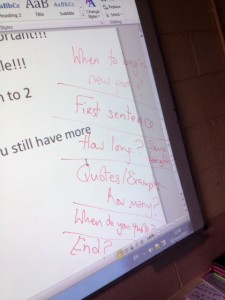Writing an introduction
For this exercise, I first got students to tell me what they found confusing about introductions. We listed their “things we want to know” about introductions on the board first. I can’t remember the exact list but it was something like this:
How should it begin? (Re-phrase the question and respond with your opinion)
How do we avoid just repeating the question word for word? (divide and conquer! Separate out the ideas. Use synonyms).
Should we include quotes? / how much detail goes into the intro ? (no quotes, unless you begin with one for dramatic effect. A list of topic sentences outlining what you will discuss but keep the detailed discussion for the essay itself)
Do we list the things we’ll discuss? (Yes, see above! But don’t be a baby about it! NEVER write “In this essay I will discuss… blah blah blah“. [This is like a little kid telling their parents exactly what they are going to do before they do it “Mammy, I’m going to do a wee-wee now!“] We’re not thick. If it’s in your introduction we assume that’s because you intend to discuss it!)
How long should it be? (Anywhere between a third of a page and hall a page. Three-quarters of a page is probably too long. An introduction is supported to be brief and to the point! Long-winded is irritating)
Think of your introduction as a road map. You have been given a destination (the question) and there are lots of perfectly acceptable ways of getting there. In your introduction you lay out clearly what directions you’ll take in your essay. MAKE SURE TO USE THE WORDS FROM THE Q – but don’t begin by simply parroting back the question word for word. There is nothing worse than “I agree 100% that…..”.
Instead
- Re-phrase the question in your own words to prove that you have understood it.
- Divide the question into manageable chunks and discuss each part of the Q.
- List the things your essay will discuss to answer the question asked.
Let’s take an example:
“Iago has a very low opinion of human nature and this colours his interpretation of every person in his life”
Begin with part of the question:I re-phrase it in my own words. (Give an example)
Iago certainly feels superior to many of the people in his life. In the opening scene he criticises Othello & Cassio and he delights in creating pain and suffering for Brabantio. He does not respect other human beings, nor does he have a high opinion of anyone but himself.
Now I turn my attention to the other part of the question & list the things I’ll discuss in the body of my essay
He takes the most negative possible interpretation of human behaviour in every situation, accusing Othello of being a lustful gold-digger; accusing Cassio of being a naïve ladies-man with little battlefield experience; accusing Dedemona of being fickle and motivated only by lust; and finally, confiding to both Roderigo and to us the audience his general outlook on human beings, which is that they are selfish and self-serving.
Body Paragraphs
Next, I got students to list the things they found confusing about writing paragraphs. We came up with this set of  questions they wanted answers to:
questions they wanted answers to:
When do you begin a new paragraph? (When you’ve got a new idea to discuss)
What should your first sentence do? (Respond to the Q with one relevant idea)
(NOT TELL THE STORY was actually my first response to this question!)
How long should it be? Do all paragraphs need to be the same length? How long is too long? (Depends how much you have to say about that idea. Paragraphs can vary in length. More than 3/4 of a page is too long.)
How many quotes and examples should you include? (Hard to answer this one. Depends on the point you’re making. At least 3 quotes, no more than 7? Quotes can be two or three words – e.g. “honest Iago” or half a speech! Don’t include really long quotes – it’s irritating and unnecessary).
When do you quote? Can you begin with a quote or should you always begin with a statement (Quote to prove a point. Always begin with a statement? Yes, yes, yes – remember PQE from First Year English!)
How do you end a paragraph? (Show how what you’ve just said is relevant to the Q. You may want to flow into your next point – this can be done in the final sentence of this paragraph or at the beginning of the topic sentence in the next paragraph. FLOW MATTERS so make sure you use connectives in your writing)
Here’s the advice and example I came up with to answer their questions in a concrete and specific way:
Each paragraph should begin with a topic sentence. This first sentence indicates what your paragraph will be about. For example:
Despite having fought side by side with Othello for many years, Iago has a very negative opinion of his employer. (this is your topic sentence)
The rest of the paragraph provides specific examples which illustrate that the topic sentence is true (either quotes or paraphrasing or RELEVANT plot details – but don’t fall into the trap of telling the story)
His bitterness at not getting promoted to lieutenant leads him to believe that Othello was “loving his own pride and purposes” when he gave the job to Cassio. Iago sees his decision as a personal slight and an insult, because Iago has a very high opinion of himself “I know my price, I am worth no less a place”. His bitterness leads him on a quest for revenge and he begins to see people as simply pawns in a game of chess; each one will either help or hinder him in his quest. For example, rather than search for a new job, Iago decides to do everything in his power to destroy Othello. He takes a very negative interpretation of Othello’s decision to marry Desdemona, telling Cassio that Othello was motivated purely by her money and is satisfied now because he has “boarded a land-carrick” or treasure ship and is now guaranteed wealth (through his wife’s fortune) for the rest of his life.
If you want to continue discussing the same basic idea (eg Iago’s low opinion of Othello) but your paragraph is getting too long, then break it into two paragraphs. You’ll still need a topic sentence, but this one will just introduce a related idea. For example:
Iago is also very quick to believe the rumour that Othello has slept with his wife. He comments that “it is thought abroad that twixt my sheets he has done my office” and refuses to even bother checking if this rumour is true or not. This is hardly surprising given how certain he was that Othello was motivated by lust rather than love (“even now, now, very now, an old black ram is tupping your white ewe”) – it’s as if Iago refuses to even consider the idea that human beings might be motivated by a noble emotion like love rather than by their base animalistic desires. Iago allows for the fact that human beings might be essentially ‘good’ when he describes Othello as being “of a free and open nature that thinks men honest that but seem to be so” but he sees this as naïve and stupid.
Finish your paragraph (or if the same basic idea stretches to two paragraphs, finish the second paragraph) by stating clearly how what you’ve just discussed is relevant to the question asked.
Thus, it is clear that Iago thinks very little of Othello, seeing him as motivated by lust and greed and interpreting his trusting nature as a weakness rather than a virtue. (this is the final sentence of this paragraph/section on Iago’s interpretation of Othello’s behaviour).
 I used the analogy of a paragraph being a bit like a sandwich. The top slice of bread is the topic sentence. The meat in the middle is basically the quotes and examples you use to develop your discussion and prove your point. The final sentence is like the bottom slice of bread in the sandwich – it holds everything together, connecting the meat (the quotes & examples) back to the top slice (the question asked).
I used the analogy of a paragraph being a bit like a sandwich. The top slice of bread is the topic sentence. The meat in the middle is basically the quotes and examples you use to develop your discussion and prove your point. The final sentence is like the bottom slice of bread in the sandwich – it holds everything together, connecting the meat (the quotes & examples) back to the top slice (the question asked).
Without the meat the sandwich wouldn’t be a sandwich but without one of the two slices of bread it would also not be a sandwich! You need both slices of bread and lots of filling. If you have lots to say for one idea and it stretches into two paragraphs, this is basically a double-decker sandwich. It’s fine but too many double-deckers in one essay might mean you run out of space (or time!) so don’t fill up that essay too much with double-deckers!!!
Alternative ways of structuring this essay:
You could go through the play chronologically –
par 1 could discuss his failure to get promoted;
par 2 could discuss breaking the news to Brabantio;
par 3 could discuss his interpretation of Othello & Desdemona’s marriage;
par 4 could discuss the speech he makes to Roderigo about reason being superior to emotion;
par 5 could discuss his plan for revenge.
There is not ONE PERFECT WAY to structure any essay – the important thing is that each paragraph has a clear focus and that each paragraph clearly responds to the question. If you just tell the story, you will NOT do well.
NOTE: This example only deals with Act 1 because this is an essay we did when we finished that act. Obviously in the exam you’d be expected to draw from the events of the entire play, not just Act 1.










